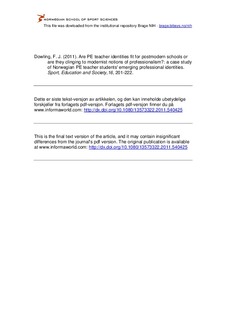| dc.contributor.author | Dowling, Fiona | |
| dc.date.accessioned | 2012-08-28T10:12:25Z | |
| dc.date.available | 2012-08-28T10:12:25Z | |
| dc.date.issued | 2011-02-16 | |
| dc.identifier.citation | Sport, Education and Society. 2011, 16(2), 201-222 | no_NO |
| dc.identifier.issn | 1470-1243 | |
| dc.identifier.issn | 1357-3322 | |
| dc.identifier.uri | http://hdl.handle.net/11250/170887 | |
| dc.description | I Brage finner du siste tekst-versjon av artikkelen, og den kan inneholde ubetydelige forskjeller fra forlagets pdf-versjon. Forlagets pdf-versjon finner du på www.tandfonline.com: http://dx.doi.org/10.1080/13573322.2011.540425 / In Brage you'll find the final text version of the article, and it may contain insignificant differences from the journal's pdf version. The original publication is available at www.tandfonline.com: http://dx.doi.org/10.1080/13573322.2011.540425 | no_NO |
| dc.description.abstract | The concept of the ‘professional teacher’ is highly contestable, and the array of definitions that circulate in teacher education draw on competing theoretical and ideological positions. This paper explores what discourses about professionalism are currently available within Norwegian physical education teacher education (PETE) and, in particular, asks whether they reflect the needs of postmodern teachers in a ‘knowledge society’? It acknowledges that there are currently two dominant discourses about the ‘professional’ teacher, so-called ‘activist’ or ‘managerial’ professionalism, and asks whether, and in what ways, PE student teachers engage with and/or reject the discourses’ competing ideas about what counts as ‘good’ practice. By analysing the student teachers’ emerging professional identities, the paper aims to reveal not only the students’ subjective meanings about professionalism, but also illuminate the current power structures that operate in PETE about relevant ‘professional’ knowledge.
It draws on data from group interviews with 12 Norwegian PE students in their final year of study for a bachelor degree in PETE, and a critical content analysis of PETE curricula at two institutions of higher education.
The paper highlights the way in which views about professionalism in PETE tend to be normative in nature, and are not founded on explicit theoretical ideas about ‘good’ practice or theoretical understandings of the role of the teacher in postmodern schools. Indeed, PETE programmes seem to do little to disrupt recruits’ ‘apprenticeship-of-observation’, even though Lortie revealed this problematic aspect of professional socialisation over three decades ago. The student teachers’ narratives seem to be locked into ‘modernist’ or ‘classical’ ideas about good PE practice, which are inappropriate for meeting the challenges of working with socially diverse pupils or in collaborative teacher groups. Recruitment to PETE via examinable PE appears paradoxically to accentuate the students’ sports performing (teacher) selves, rather than providing them with a solid understanding of PE's content knowledge on which to develop broader PE teacher professional identities. Therefore, the paper asks whether teacher educators need to reassess their recruitment policies to PETE, as well as to systematically re-analyse their ‘taken-for-granted’ notions of teacher professionalism. | no_NO |
| dc.language.iso | eng | no_NO |
| dc.publisher | Taylor & Francis | no_NO |
| dc.subject | PE teacher | no_NO |
| dc.subject | professional identity | no_NO |
| dc.subject | discourse | no_NO |
| dc.subject | postmodern schools | no_NO |
| dc.subject | PE teacher education | no_NO |
| dc.title | ‘Are PE teacher identities fit for postmodern schools or are they clinging to modernist notions of professionalism?’: a case study of Norwegian PE teacher students’ emerging professional identities | no_NO |
| dc.type | Journal article | no_NO |
| dc.type | Peer reviewed | no_NO |
| dc.subject.nsi | VDP::Social science: 200::Social science in sports: 330::Other subjects within physical education: 339 | no_NO |
| dc.source.pagenumber | 201-222 | no_NO |
| dc.source.volume | 16 | no_NO |
| dc.source.journal | Sport, Education and Society | no_NO |
| dc.source.issue | 2 | no_NO |
